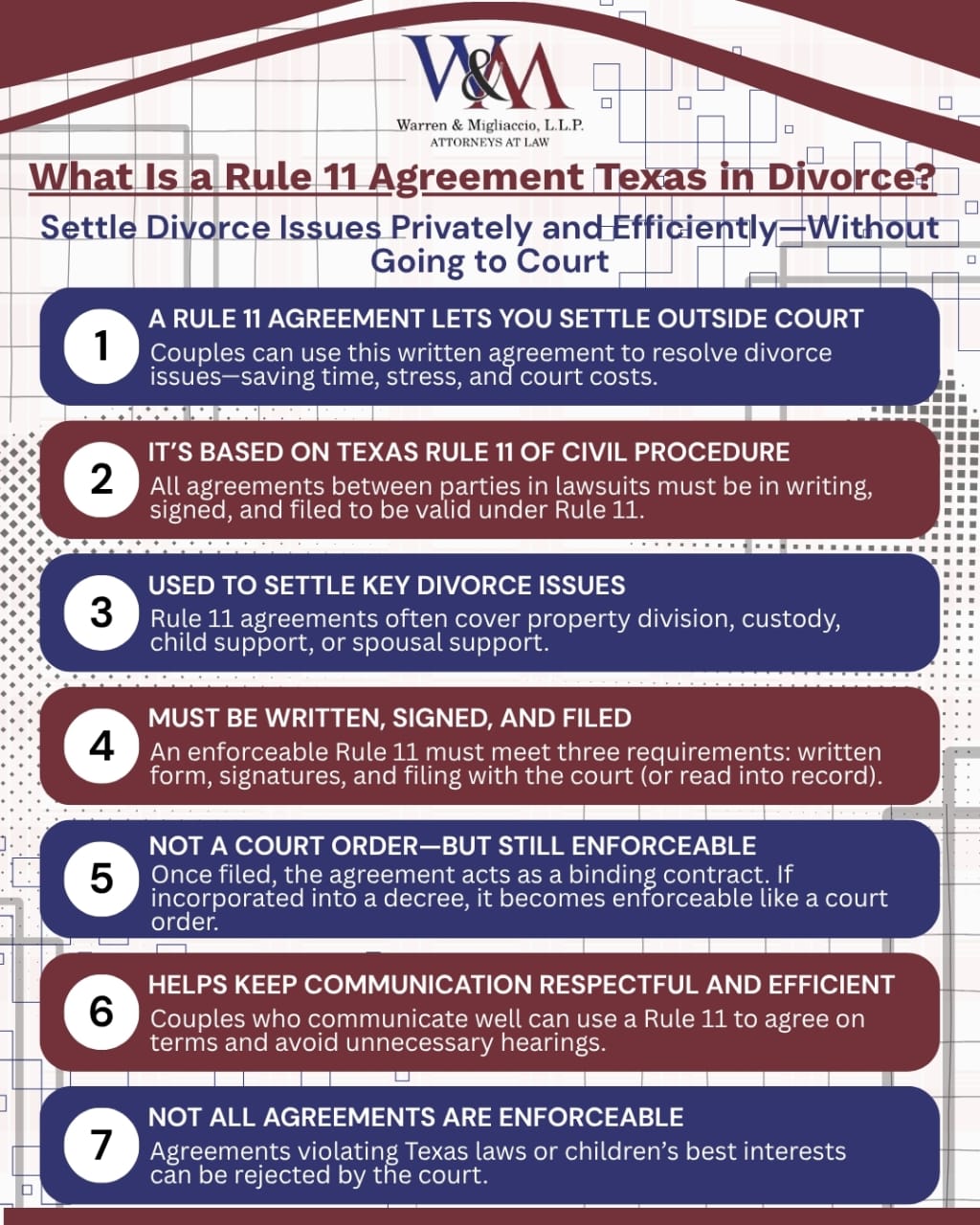Despite Hollywood portrayals, dissolving your marriage doesn’t automatically mean court. In fact, not only do you not have to go to court, but the vast majority of Texas divorce and related civil cases are settled without judicial interference.
If you and your spouse can maintain respectful communication and compromise, you may be able to resolve some, if not all, of your issues using a Rule 11 agreement. These agreements are utilized to manage various aspects of a lawsuit while avoiding lengthy court proceedings, thus saving time and costs.
Here’s what you need to know about Rule 11 agreement Texas and how Warren & Migliaccio can use it to help streamline your divorce.
What is a Rule 11 Agreement in Texas?
A Rule 11 agreement is a written contract used to settle legal disputes. It is called a “Rule 11” agreement because it comes from Rule 11 of the Texas Rules of Civil Procedure, which requires all civil court contracts to be made in writing.
These agreements are governed by the Texas Rules of Civil Procedure, providing a specific legal framework for their use. The term “Rule 11 agreement” refers to a formal, written, and binding document that formalizes agreements between parties in lawsuits, particularly in Texas civil and family law cases.
In family law, Rule 11 agreements are often used to help settle certain areas of divorce. In some situations, they’re even used as a kind of settlement agreement over the entire case. During divorce proceedings, these documents often outline things like property division, child support, and parenting time.

Rule 11 agreements are also used for memorializing agreements on a range of family law issues, including but not limited to property division, child support, and other legal issue/s such as visitation, extracurricular activities, and travel. Once signed by each party and filed with the court, it becomes a binding contract, making its terms enforceable.
Mandatory Compliance of Rule 11 Agreement
While a Rule 11 agreement is not technically a court order, compliance with this agreement is mandatory. A Rule 11 agreement essentially has the effect of a court order, even though it is not one. The terms of the agreement should be clear so that all parties know what is expected of them. In some cases, it might be possible to revoke; however, once codified into a divorce order during final judgment, you will need to petition the court to modify it.
Unlike general contracts, a Rule 11 agreement can still be enforced even after the main lawsuit is dismissed, which is not typical for standard contracts. Failure to comply with a court order carries severe consequences and may result in hefty fines and even jail time, so it’s important to take these legal actions seriously.
Once a Rule 11 agreement is properly filed, the parties are bound by its settlement terms.
Practical Applications of a Rule 11 Agreement in a Texas Divorce
A Rule 11 agreement has many practical uses during a Texas divorce. Some might use it to settle just one particular area of their legal dispute (such as alimony or adultery). Others might treat it like a documentation tool, using it to recall the details of specific agreements and conversations. In addition, Rule 11 agreements can address various issues such as modifications to deadlines or arrangements made between parties regarding their lawsuit. These agreements can address various aspects of family law cases, including property division, child custody, and support. In other cases, couples may use it as an informal settlement agreement for their entire divorce.
Similar to a marital or prenuptial agreements, Rule 11 contracts codify the wishes of both spouses into a single document. Rule 11 agreements are negotiated between the parties involved and can aid in reducing controversy and achieving a favorable outcome. By formalizing agreements in writing, these agreements help reduce controversy in family law cases, minimize misunderstandings, and promote smoother legal proceedings. Once complete, there is nothing left to fight about in court, which can drastically reduce the time, money, energy, and added stress both sides have to devote to the divorce process.
If you are considering incorporating a Rule 11 agreement into your divorce process, a skilled family law attorney can walk you through the topics commonly addressed by these agreements.
Property Division
Texas is a community property state under Family Code § 3.002, which means that anything either spouse acquires during marriage—be it debt, property, money, or investments—belongs to both equally. These marital assets must be divided when you break up. However, there’s no need for the court to get involved if you can help it.
A Rule 11 agreement allows couples to make their own decisions about property. So long as you can communicate respectfully and are willing to compromise, your joint decisions about your marital property can be drafted into this agreement amicably.
The terms you agree on regarding property division can later be incorporated into a final agreement, which will be reflected in the court’s final order.
Child Custody and Child Support
Another area commonly addressed by Rule 11 agreements is child custody. Amicable co-parents here can structure parenting time, visitation, and custody rights however they want, without court interference. Rule 11 agreements allow parents to create a customized schedule for their children, including visitation and other arrangements. Parties can also agree to pass or reschedule hearings or deadlines related to custody through a Rule 11 agreement. Using a Rule 11 agreement can minimize court involvement in decisions about children.
That said, just because you agree doesn’t mean the court will.
Regarding child custody decisions, Texas family law requires judges to make them according to the child’s best interest—not based on what the parents want. So, while your input into these matters is helpful to determining that best interest, it isn’t infallible. Texas judges have the right to adjust specific terms (such as child support amount and parental rights) if they don’t meet state requirements.

Spousal Support
Spousal support (or “alimony”) is regular payments made to a supporting spouse after divorce. This money helps them get on their feet after divorce and ensures they aren’t unfairly penalized for parting ways. However, this amount is not set in stone and can quickly become a source of contention during divorce.
Rather than get bogged down in calculations, couples could utilize this written agreement to settle on a fair amount outside of court. Another application could be to strike a compromise.
For example, Texas is one of only a few states that still allows fault to be considered during divorce. These claims can significantly impact how much marital property you receive, so a savvy partner might consider offering a greater share of marital property or alimony in exchange for dropping fault arguments.
An experienced attorney can help you maximize the impact of this document during your divorce. It is crucial to have a carefully prepared agreement to ensure clarity and enforceability regarding spousal support.
Not all Rule 11 Agreements Are Enforceable
Just because you and your spouse have an agreement doesn’t mean it will be enforceable. To be valid, your Rule 11 agreement must meet specific requirements. Informal agreements between parties or attorneys regarding a lawsuit are not enforceable unless they meet these requirements. Enforcing a Rule 11 agreement in court requires that it be an enforceable agreement, meeting all legal standards so the court can uphold its terms.
- In writing and proper form. A handwritten note, typed document, or email are all acceptable forms of writing for this purpose, as long as the agreement is in the proper form—a signed writing, which can include electronic signatures under Texas law.
- Signed. The document must be signed by both parties and their respective lawyers. (An electronic signature will require extra verification.)
- Filed with the court. A Rule 11 agreement is not valid until filed with the court. Alternatively, the document can be read into the record during court proceedings.
Using a Rule 11 agreement can help avoid unnecessary court costs and reduce the burden of litigation by resolving issues outside of court.
Rule 11 agreements also can’t contradict other Texas laws. This is particularly important regarding areas such as child support and parenting time. In Texas, judges are required to make all child custody decisions according to the child’s best interest. This means they are not required to uphold any terms that violate certain state standards (such as child support amounts)—even if both parents agree. Rule 11 agreements can also be used to extend deadlines for filing an answer or other procedural steps in litigation.
Drafting a Successful Rule 11 Agreement
Drafting a Rule 11 agreement for your divorce can be a concise, efficient way to settle disputes during your divorce. However, it isn’t appropriate for every situation (such as child custody). It is generally wiser to use formal agreements like Agreed Parenting Plans instead of Rule 11 for substantive family law issues. Knowing when to use it and when to try an alternative method is essential to effectively utilizing this tool. It is important that your Rule 11 agreement is well-prepared and carefully negotiated, as a properly prepared and negotiated agreement is more likely to be enforceable and reflect the true intentions of both parties.

When drafting your agreement, you should also:
- Review its terms carefully. Make sure you understand your obligations and don’t sign something if something doesn’t feel fair.
- Use clear, conscience language. This will help avoid confusion and minimize the risk of future disputes.
- Don’t assume something is implied. No matter what topic you’re covering, it’s essential to clearly outline all the terms and avoid assumptions.
An experienced family law attorney can help you draft a Rule 11 agreement Texas courts will accept. Hiring experienced counsel ensures your agreement is properly prepared, and your attorney can help you decide the best course of action for your situation. Ultimately, working with skilled legal counsel can help you achieve your goals and protect your interests. For a step-by-step look at the Texas divorce process, start here.

Frequently Asked Questions: Rule 11 Agreement Texas
FAQs About Rule 11 Agreements in Texas
What are the three requirements for a valid Rule 11 agreement in Texas?
To be enforceable, a Texas Rule 11 agreement must be formalized so the court can recognize it. It must be:
In writing
Signed by the parties or their attorneys
Filed with the trial court record — or stated in open court and entered of record
What’s the difference between a Rule 11 agreement and a mediated settlement agreement?
A Rule 11 can be revoked until judgment; a Mediated Settlement Agreement (MSA) that meets Family Code §153.0071(d) is binding and entitles a party to judgment notwithstanding Rule 11. For custody and support, MSAs or Agreed Parenting Plans are usually better than Rule 11 for durable outcomes.
Can you revoke a Rule 11 agreement in Texas?
Yes. Either party may revoke consent and withdraw consent any time before the court renders judgment on the agreement. If consent is withdrawn, the court can’t enter an agreed order on those terms; the other party’s remedy is typically a breach-of-contract claim (e.g., specific performance, damages, attorney’s fees).
Are electronic signatures valid on Rule 11 agreements?
Yes. Under Texas’s Uniform Electronic Transactions Act, electronic signatures and emails can satisfy “writing” and “signature” requirements when intent to sign is clear. Best practice: use a reputable e-signature platform and ensure the executed agreement is filed in the court record.
FAQs About Enforcement and Legal Effect
Is a Rule 11 agreement the same as a court order?
No. A Rule 11 is a contract, not a court order. If the judge incorporates its terms into a signed order or final decree, those terms become part of the judgment and are enforced as an order; otherwise, enforcement is through a contract action, not contempt.
What happens if someone breaches a Rule 11 agreement?
If the agreement wasn’t incorporated into a judgment, pursue a breach-of-contract action (possible specific performance, damages, attorney’s fees). If the terms were merged into a court order, use enforcement tools for orders (e.g., motion to enforce, contempt where appropriate).
Can you be held in contempt for violating a Rule 11 agreement?
Usually no. Contempt generally requires a court order. A standalone Rule 11 is enforced like a contract. If its terms are later incorporated into an order, noncompliance can expose the party to contempt remedies.
How long does a Rule 11 agreement stay in effect?
It depends. If not merged into a final judgment, a Rule 11 remains enforceable as a contract—often via a separate contract suit—even after dismissal. Once incorporated into a decree, the terms are enforced or modified like any other court order.
FAQs About Use and Scope
Can Rule 11 agreements be used for child custody?
Yes, parents can propose custody, possession, and child support terms in a Rule 11. But the court must find they serve the best interest of the child and meet statutory minimums. Judges may modify or reject terms that conflict with Texas requirements.
Can you use a Rule 11 agreement before a lawsuit is filed?
No. Rule 11 applies to agreements in a pending suit. Pre-suit arrangements are ordinary contracts; they gain Rule 11 status only if later filed with the court or read into the record after the case is on file.
Can a Rule 11 agreement change deadlines for discovery or initial disclosures?
Yes. Parties routinely use Rule 11 to extend discovery or disclosure deadlines, reset hearings or mediation, and clarify interim procedures. Memorializing logistics in a Rule 11 keeps the case moving and reduces motion practice.
Does a Rule 11 agreement need to be notarized in Texas?
No. Notarization isn’t required. Rule 11 requires a writing, signature by the parties or their attorneys, and filing with the court, or stating the agreement in open court and entering it of record.
Can a lawyer sign a Rule 11 agreement on behalf of their client?
Yes. An attorney’s signature can bind a client for Rule 11 purposes. Best practice: have both the parties and their attorneys sign to reduce later disputes about consent and understanding.
Talk to Our Dallas Texas Attorney About Drafting a Rule 11 Agreement
No two marriages are ever the same, which means that no two divorces are, either. And when it comes to settling divorce matters, you want a team that fights for your individual needs.
At Warren & Migliaccio, we care deeply about our work and are dedicated to providing each client with quality, individualized representation. If you have questions about using a Rule 11 agreement in your divorce, we want to hear from you. Call our law firm today at (888) 584-9614 or contact us online for a free consultation. Let one of our dedicated family attorneys protect your rights and provide you the best legal advice during this important transition.
